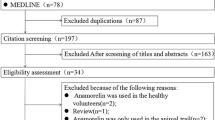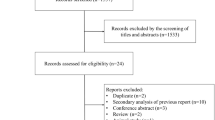Abstract
Purpose
Although corticosteroids are widely used to relieve anorexia, information regarding the factors predicting responses to corticosteroids remains limited. The purpose of the study is to identify potential factors predicting responses to corticosteroids for anorexia in advanced cancer patients.
Methods
Inclusion criteria for this multicenter prospective observational study were patients who had metastatic or locally advanced cancer and had an anorexia intensity score of 4 or more on a 0–10 Numerical Rating Scale (NRS). Univariate and multivariate analyses were conducted to identify the factors predicting ≥2-point reduction in NRS on day 3.
Results
Among 180 patients who received corticosteroids, 99 (55 %; 95 % confidence interval [CI], 47–62 %) had a response with ≥2-point reduction. Factors that significantly predicted responses were Palliative Performance Scale (PPS) > 40 and absence of drowsiness. In addition, factors that tended to be associated with ≥2-point reduction in NRS included PS 0–3, absence of diabetes mellitus, absence of peripheral edema, presence of lung metastasis, absence of peritoneal metastasis, baseline anorexia NRS of >6, presence of pain, and presence of constipation. A multivariate analysis showed that the independent factors predicting responses were PPS of >40 (odds ratio = 2.7 [95 % CI = 1.4–5.2]), absence of drowsiness (2.6 [1.3–5.0]), and baseline NRS of >6 (2.4 [1.1–4.8]).
Conclusions
Treatment responses to corticosteroids for anorexia may be predicted by PPS, drowsiness, and baseline symptom intensity. Larger prospective studies are needed to confirm these results.

Similar content being viewed by others
References
Solano JP, Gomes B, Higginson IJ (2006) A comparison of symptom prevalence in far advanced cancer, AIDS, heart disease, chronic obstructive pulmonary disease and renal disease. J Pain Symptom Manag 31:58–69
Seow H, Barbera L, Dudgeon D, Howell D, Husain A, Atzema C, Sussman J, Liu Y, Earle C, Sutradhar R (2011) Trajectory of performance status and symptom scores for patients with cancer during the last six months of life. J Clin Oncol 29:1151–1158. doi:10.1200/JCO.2010.30.7173
Moertel CG, Schutt AJ, Reitemeier RJ, Hahn RG (1974) Corticosteroid therapy of preterminal gastrointestinal cancer. Cancer 33:1607–1609
Bruera E, Roca E, Cedaro L, Carraro S, Chacon R (1985) Action of oral methylprednisolone in terminal cancer patients: a prospective randomized double-blind study. Cancer Treat Rep 69:751–754
Willox JC, Corr J, Shaw J, et al. (1984) Prednisolone as an appetite stimulant in patients with cancer. Br Med J (Clin Res Ed) 288:27
Della Cuna GR, Pellegrini A, Piazzi M (1989) Effect of methylprednisolone sodium succinate on quality of life in preterminal cancer patients: a placebo-controlled, multicenter study. The methylprednisolone preterminal cancer study group. Eur J Cancer Clin Oncol 25:1817–1821
Popiela T, Lucchi R, Giongo F (1989) Methylprednisolone as palliative therapy for female terminal cancer patients. The methylprednisolone female preterminal cancer study group. Eur J Cancer Clin Oncol 25:1823–1829
Bruera E, Moyano JR, Sala R, Rico MA, Bosnjak S, Bertolino M, Willey J, Strasser F, Palmer JL (2004) Dexamethasone in addition to metoclopramide for chronic nausea in patients with advanced cancer: a randomized controlled trial. J Pain Symptom Manag 28:381–388
Inoue A, Yamada Y, Matsumura Y, Shimada Y, Muro K, Gotoh M, Hamaguchi T, Mizuno T, Shirao K (2003) Randomized study of dexamethasone treatment for delayed emesis, anorexia and fatigue induced by irinotecan. Support Care Cancer 11:528–532
Currow DC, Plummer J, Frith P, Abernethy AP (2007) Can we predict which patients with refractory dyspnea will respond to opioids? J Palliat Med 10:1031–1036
Currow DC, Rowett D, Doogue M, To TH, Abernethy AP (2012) An international initiative to create a collaborative for pharmacovigilance in hospice and palliative care clinical practice. J Palliat Med 15:282–286. doi:10.1089/jpm.2012.9605
Matsuo N, Morita T, Iwase S (2011) Efficacy and undesirable effects of corticosteroid therapy experienced by palliative care specialists in Japan: a nationwide survey. J Palliat Med 14:840–845. doi:10.1089/jpm.2011.0002
Matsuo N, Morita T, Matsuda Y, et al. Predictors of responses to corticosteroids for cancer-related fatigue in advanced cancer patients: A multicenter prospective observational study. J Pain Symptom Manage. In press
Selby D, Cascella A, Gardiner K, Do R, Moravan V, Myers J, Chow E (2010) A single set of numerical cutpoints to define moderate and severe symptoms for the Edmonton symptom assessment system. J Pain Symptom Manag 39:241–249. doi:10.1016/j.jpainsymman
Matsuo N, Morita T, Iwase S (2012) Physician-reported corticosteroid therapy practices in certified palliative care units in Japan: a nationwide survey. J Palliat Med 15:1011–1016. doi:10.1089/jpm.2011.0534
Lundström SH, Fürst CJ (2006) The use of corticosteroids in Swedish palliative care. Acta Oncol 45:430–437
Hardy JR, Rees E, Ling J, Burman R, Feuer D, Broadley K, Stone P (2001) A prospective survey of the use of dexamethasone on a palliative care unit. Palliat Med 15:3–8
Mercadante S, Fulfaro F, Casuccio A (2001) The use of corticosteroids in home palliative care. Support Care Cancer 9:386–389
Okuyama T, Wang XS, Akechi T, Mendoza TR, Hosaka T, Cleeland CS, Uchitomi Y (2003) Japanese version of the MD Anderson symptom inventory: a validation study. J Pain Symptom Manag 26:1093–1104
Morita T, Tsunoda J, Inoue S, Chihara S (1999) Validity of the palliative performance scale from a survival perspective. J Pain Symptom Manag 18:2–3
Miyashita M, Matoba K, Sasahara T, Kizawa Y, Maruguchi M, Abe M, Kawa M, Shima Y (2004) Reliability and validity of the Japanese version of the support team assessment schedule (STAS-J). Palliat Support Care 2:379–385
American Psychiatric Association (2000) Mood Disorders. Diagnostic and Statistical Manual of Mental Disorders, Fourth Edition, Text Revision. Washington, DC, pp 369–382
Bedard G, Zeng L, Zhang L, Lauzon N, Holden L, Tsao M, Danjoux C, Barnes E, Sahgal A, Poon M, Chow E (2013) Minimal clinically important differences in the Edmonton symptom assessment system in patients with advanced cancer. J Pain Symptom Manag 46:192–200. doi:10.1016/j.jpainsymman.2012.07.022
Hui D, Shamieh O, Paiva CE, Perez-Cruz PE, Kwon JH, Muckaden MA, Park M, Yennu S, Kang JH, Bruera E (2015) Minimal clinically important differences in the Edmonton Symptom Assessment Scale in cancer patients: a prospective, multicenter study. Cancer 121:3027–3035. doi:10.1002/cncr.29437
Yennurajalingam S, Frisbee-Hume S, Palmer JL, Delgado-Guay MO, Bull J, Phan AT, Tannir NM, Litton JK, Reddy A, Hui D, Dalal S, Massie L, Reddy SK, Bruera E (2013) Reduction of cancer-related fatigue with dexamethasone: a double-blind, randomized, placebo-controlled trial in patients with advanced cancer. J Clin Oncol 31:3076–3082. doi:10.1200/JCO.2012.44.4661
Paulsen O, Klepstad P, Rosland JH, Aass N, Albert E, Fayers P, Kaasa S (2014) Efficacy of methylprednisolone on pain, fatigue, and appetite loss in patients with advanced cancer using opioids: a randomized, placebo-controlled, double-blind trial. J Clin Oncol 32:3221–3228. doi:10.1200/JCO.2013.54.3926
Denton A, Shaw J (2014) Corticosteroid prescribing in palliative care settings: a retrospective analysis in New Zealand. BMC Palliat Care 13:7. doi:10.1186/1472-684X-13-7
Needham PR, Daley AG, Lennard RF (1992) Steroids in advanced cancer: survey of current practice. BMJ 305:999
Akechi T, Okuyama T, Sugawara Y, Nakano T, Shima Y, Uchitomi Y (2004) Major depression, adjustment disorders, and post-traumatic stress disorder in terminally ill cancer patients: associated and predictive factors. J Clin Oncol 22:1957–1965
Acknowledgments
This research is (partially) supported by the Practical Research for Innovative Cancer Control from Japan Agency for Medical Research and Development, AMED.
Author information
Authors and Affiliations
Corresponding author
Ethics declarations
Conflicts of interest
The authors declare that they have no conflict of interest.
Rights and permissions
About this article
Cite this article
Matsuo, N., Morita, T., Matsuda, Y. et al. Predictors of responses to corticosteroids for anorexia in advanced cancer patients: a multicenter prospective observational study. Support Care Cancer 25, 41–50 (2017). https://doi.org/10.1007/s00520-016-3383-z
Received:
Accepted:
Published:
Issue Date:
DOI: https://doi.org/10.1007/s00520-016-3383-z




